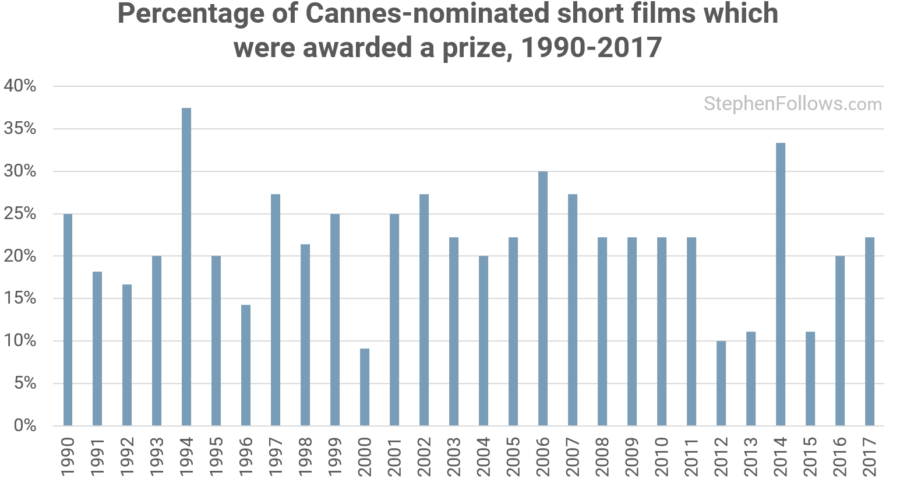What do Cannes-nominated short films have in common?

In just under a week's time, the 2018 Cannes Film Festival will come to a close and the winners of the top prizes will be announced. I've looked at the feature films nominated for the Palme d'Or, the festival's top award, in previous articles (here, here, here, here and here).
So today I am going to turn to the main competition's little sister - the Short Film Palme d'Or (or Palme d'Or du Court Métrage, to give it its French name).
I looked at all films nominated for the Short Film Palme d'Or between the first Cannes film festival in 1946 and this year (2018).
How many short films are nominated for the Palme d'Or?
Including this year's nominees, 1,211 short films have been in the running for the Palme d'Or since the start of the Cannes Film Festival in 1946. That may sound like a lot and that's because the number of nominated short films has dropped considerably over the years.
Over half of all nominated short films were featured in the first sixteen editions of the festival, with the other half being featured over the course of the following 55 editions.

Note: The festival did not run in 1948 nor 1950, hence the gaps at the start of the above graph.
(Almost) everyone's a winner
As the chart above shows, in recent years the average number of short films nominated each year is ten. There is only one Short Film Palme d'Or award so you would be forgiven for assuming that only 10% of films go home with an award. Not so. In addition to the main prize, films have been awarded a number of lesser (but still pretty impressive) accolades over the years, including:
First place ("Premier Prix"), which is rather confusing as it's not the main award - perhaps why it was only awarded in 1984.
Second prize ("Deuxième Prix") which was awarded in 1987 and 1994.
Third prize ("Troisième Prix")
A special mention ("Mention Spéciale") which has been award six times since 1990.
The Jury prize which has been officially called a number of things over the years including "Prix du Jury", "Prix du Jury Ex-æquo", "Prix Spécial du Jury", "Premier Prix du Jury", "Prix du Jury avec mention" and "Prix Spécial du Jury Ex-aequo". Sometimes the jury award is split by type, such as in 1986 when the jury awarded both a fiction and animation prize.
A second place Jury prize ("Deuxième Prix du Jury") was awarded in 1976 and 1990
All this adds up to mean that if your short film is nominated in Cannes then you have a 21% chance of coming home with something for the mantlepiece.

Vive la France!
The Cannes Film Festival is often referred to as the world's top film festival, and therefore you might expect it to objectively treat films from all over the world equally. Not so. In previous research, I showed that over half of feature films nominated in Cannes over the last five years were produced in France or were French. The picture is similar for short films, although less pronounced.
Just under a fifth of Cannes-nominated short films this decade originated in France.

Since the start of the Cannes Film Festival, 47% of short films have come from just seven countries - France (14%), United States (8%), United Kingdom (6%), Canada (5%), Belgium (5%), Italy (4%) and the Netherlands (4%).
The European dominance becomes even clearer if we look at the continent of origin for all Cannes-nominated short films.

How short can Cannes shorts be?
The current maximum running time for eligible short films is 15 minutes, and almost a quarter of movies use this full time.

As you may have spotted, a small number of films have overrun the current maximum length. I don't know if this is due to a recent rule change, an admin error or lax rule application. Since 1990, four films are officially listed as lasting 16 minutes, including 2009 Palme d'Or winning short film Arena.
The people holding the shorts up
Of all Cannes-nominated short films between 1990 and 2018, 91.7% had one director, 7.6% had two directors and only two films had more than two. Of the 305 people who have directed a Cannes-nominated short film over this period, only twelve have been nominated twice.
The tale is similar for producers, with only sixteen of the 489 short film producers being nominated more than once. The 'Most Nominated Producer' moniker goes to György Durst who has had four films in competition, two of which won the Palme d'Or (Esö után and Szél) and two of which did not (Before Dawn and 411-Z).
Over the past three decades, 23% of directors, 25% of writers and 40% of producers have been female.

Notes
The primary source for today's research was the official Cannes festival archives, with extra data from IMDb, Wikipedia and my own gender database. In a few cases the official Cannes data seemed questionable (such as listing short films as running 495 and 930 minutes long!) and so I looked to verify all the data points I could.



